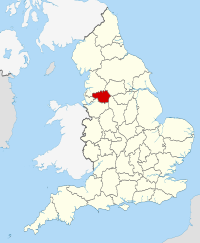
Back Greater Manchester Combined Authority Danish Autorité combinée du Grand Manchester French Greater Manchester Combined Authority SIMPLE 大曼徹斯特管理局 Chinese
Greater Manchester Combined Authority | |
|---|---|
 | |
 Greater Manchester within England | |
| Type | |
| Type | |
| Houses | Unicameral |
Term limits | None |
| History | |
| Founded | 1 April 2011 |
| Preceded by | AGMA |
| Leadership | |
Caroline Simpson since June 2024 | |
GMCA Managing Director | Andrew Lightfoot since June 2024 |
TfGM Managing Director | Steve Warrener since January 2024 |
GMFRS Chief Fire Officer | Dave Russel since September 2020 |
| Structure | |
| Seats | 11 constituent members |
 | |
Political groups |
|
| Elections | |
| Indirect election (10 of 11 seats), directly elected mayor[1] | |
First election | 4 May 2017 |
Last election | 2 May 2024 |
Next election | 4 May 2028 |
| Meeting place | |
 | |
| Tootal Buildings, 56 Oxford Street, Manchester M1 6EU[2] | |
| Website | |
| www | |
The Greater Manchester Combined Authority (GMCA) is a combined authority for Greater Manchester, England. It was established on 1 April 2011 and consists of 11 members: 10 indirectly elected members, each a directly elected councillor from one of the ten metropolitan boroughs that comprise Greater Manchester, together with the directly elected Mayor of Greater Manchester. The authority derives most of its powers from the Local Government Act 2000 and Local Democracy, Economic Development and Construction Act 2009,[3] and replaced a range of single-purpose joint boards and quangos to provide a formal administrative authority for Greater Manchester for the first time since the abolition of Greater Manchester County Council in 1986.
The planning policies of the GMCA were developed in the 2000s by the Association of Greater Manchester Authorities in the Greater Manchester Strategy. It is a strategic authority with powers over public transport, skills, housing, regeneration, waste management, carbon neutrality and planning permission. Functional executive bodies, such as Transport for Greater Manchester, are responsible for delivery of services in these areas.[3] The GMCA appoints a Chair and Vice-Chairs from among its ten executive members.
The costs of the GMCA that are reasonably attributable to the exercise of its functions relating to public transport, economic development and regeneration (and any start up costs) are met by its constituent councils. Such costs are funded by direct government grant and, as a precepting authority, with some money collected with local Council Tax apportioned between the constituent councils.[3]
- ^ "First Past the Post to be introduced for all local mayoral and police and crime commissioner elections".
- ^ "Contact".
- ^ a b c Association of Greater Manchester Authorities (March 2010). "Greater Manchester Combined Authority Final Scheme" (PDF). agma.gov.uk. Archived from the original (PDF) on 16 December 2010. Retrieved 30 March 2010.